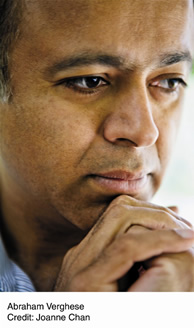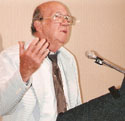Home Again
Abraham Verghese heads for his homeland—and tells the story in a new essay for The New York Times
May 21, 2012 Abraham Verghese is a Renaissance man for our multicultural age: an American citizen born in Ethiopia to Indian parents from the Kerala region, he is a physician who trained in New York and Tennessee (and practiced in Texas and California), an author who studied at the legendary Iowa Writers’ Workshop, and a Syrian Christian whose Hindu ancestors were converted to the faith by the evangelizing of St. Thomas himself. In most ways, this fluid sense of identity has served Verghese well, informing a vast array of essays, memoirs, and journal articles, as well as one sweeping novel, Cutting for Stone, that spans several continents and has a page-turning plot most often compared to the work of John Irving.
 (The novel has also been on The New York Times bestseller list for more than two years, sold more than a million copies in twenty-five different languages, and will soon be released as a feature film by Anonymous Content.)
(The novel has also been on The New York Times bestseller list for more than two years, sold more than a million copies in twenty-five different languages, and will soon be released as a feature film by Anonymous Content.)
But in the wake of a painful divorce, Verghese writes in a new essay for The New York Times, his migratory life has also left him feeling unexpectedly unmoored:
Since I settled in America in the ’80s, my visits to Kerala have been less frequent, but the landscape and the sense of an ancestral home-once-removed lingers and beckons. I could not call Ethiopia home; the overthrow of the emperor and the emergence of Colonel Mengistu—the Stalin of Africa—made it a place that did not want me. That dislocation from the land of my birth had triggered for me The Question. I’m a proud American—becoming a citizen in 1988 was one of the most profoundly moving occasions in my life; I’m a former Texan and a recent Californian. But I’m also an embodied being (as we all are), and when asked to describe home and ancestry of the soul, where precisely was I to locate my roots?
There were more reasons than ever to revisit this question: my marriage had come apart a year before. One part of me was lost, adrift, homeless and stateless. (The other part lived in Palo Alto.) The new novel I am working on is set in Kerala, and many nights I would have vivid dreams of the land, of the Hindu god Ganesh and of the ornate, teak-lined strong room called an ara that served to store rice in my grandparents’ home. The meaning of these dreams eluded me. I found myself thinking wistfully of a visit to Kerala as a sifter, a touchstone for memories, the only way to sort out some of this confusion. When my first cousin called to invite me to his son’s marriage in Trivandrum (or Thiruvanthapuram, to call it by the name to which it has officially reverted), I had all the reasons to go.
Read the rest of this fine essay here.
To read Chapter 16‘s extensive coverage of Abraham Verghese, a former resident of Johnson City, Tennessee, please click here. For more updates on Tennessee authors, please visit Chapter 16’s News & Notes page, here.
